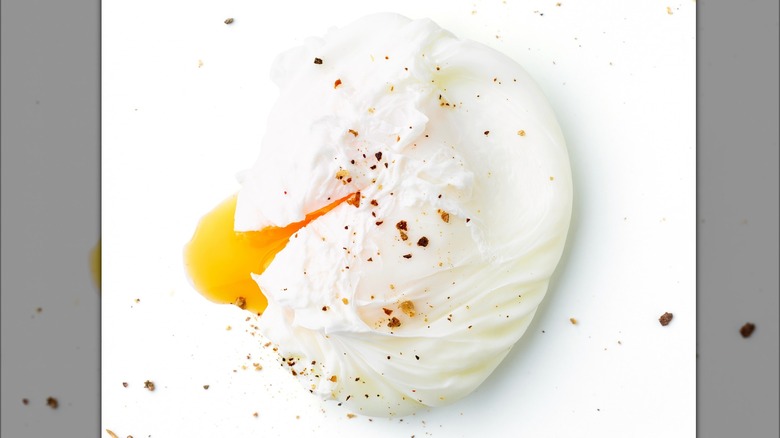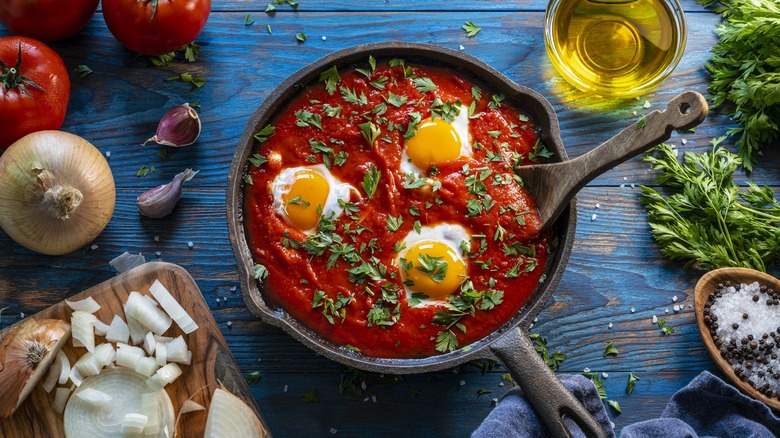You Should Definitely Be Seasoning Your Egg-Poaching Water
If you're a fan of runny eggs, there's nothing better than a poached egg with a deliciously gooey center. Its inclusion can turn an ordinary meal into a fabulous brunch experience. Still, it isn't the easiest egg preparation, so tons of resources and tips are available to make the process more effortless. Sometimes you need to start with the basics, and there's nothing more rudimentary about the technique than the water content. While poaching, the cooking water is often overlooked as simply a means to an end, but since only two standard ingredients (a poaching liquid and egg) go into the approach, it's time to give that essential element a little more attention. In short, seasoning your poaching liquid is a must.
Granted, most recipes already touch on the aspect to some degree, and typical instructions call for adding vinegar or lemon juice to the water. However, this usually only addresses the problem of retaining a tighter-formed egg, so it's primarily meant for structural purposes. As most people know, adding too much will leave a lingering tangy taste on the finished product. Yet, it also proves that the heated liquid infuses some flavor into your eggs, which you can use to your advantage.
Why flavoring your poaching liquid is important
Poaching is a delicate process that requires a little effort, by placing the raw egg into the bath and maintaining the water temperature. While these are necessary steps to consider, what you do with the poaching liquid is just as important.
Chef Charles Palmer said as much when he spoke with The New York Times: "I would usually think of poaching as a way to lose flavor in food, but if you make a liquid so intense — overly seasoned, overly spiced — then you add flavor." Although his description should be taken with a grain of salt (mainly because you don't want to enrich the liquid to the point that it's inedible), he has a point. You're introducing new tastes into the liquid that will carry over into the finished meal. As such, it's worth going beyond simple spices like salt.
One common way to enjoy poached eggs is to serve them as eggs benedict with hollandaise sauce, which usually includes lemon, paprika, butter, and even cayenne. Complementing that profile with herb-infused water can enhance the eggs. Moreover, for more intricate components, like hollandaise's relative béarnaise sauce — which is almost identical but usually includes tarragon and shallots — ingredients like basil, chives, dill, parsley, or thyme can be added to support the specific herb profile.
Don't stop at flavored water when poaching
Water will likely be the cooking medium when poaching eggs, but they can be cooked in other liquids too, such as tomato sauce in a shakshuka recipe. The Levant dish, commonly served at breakfast or lunch, is a perfect way to imbue more flavors into your eggs. The meal just calls for onions, bell peppers, chopped tomatoes with their juices, and spices like cumin, chilies or chili powder, cayenne, garlic, and paprika. After preparing the tasty sauce, drop some raw eggs over the top, lower the heat, and cover before simmering to finish cooking. As it reduces, the liquid will transfer some of those flavors into the protein.
Taking the same basic principles, you can substitute water for another flavorful poaching liquid. The only determining factor will be what you want your eggs to taste like and how they will be incorporated into your meal. Take ramen — one of the world's best instant-fix meals that's also excellent with poached eggs. Whether your favorite flavor is shrimp, chicken, or something in between, what's stopping you from adding some zing to those eggs with a matching stock?


